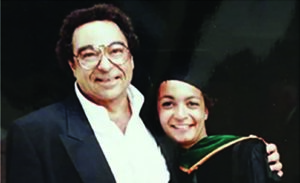
Dr. Thompson and her father at Dr. Thompson’s graduation from medical school in 1991. Dr. Thompson’s father was one of the first Black residents to integrate the obstetrics and gynecology training program at residency training in Kansas City, Mo.
In the spring of 2018, Dana Thompson, MD, MS, MBA, the Lauren D. Holinger Professor of Pediatric Otolaryngology and division head at the Ann & Robert H. Lurie Children’s Hospital of Chicago and Northwestern University Feinberg School of Medicine, boldly stood at a podium at the Triological Society’s Spring Meeting and delivered the esteemed Joseph H. Ogura annual lecture. Throughout her address, entitled, “Inspiring Change from Within,” she wove her staunch desire to tackle the issues of bias and diversity in our field with the story of her own journey of becoming the first black female otolaryngologist serving as a full professor at Northwestern University, an endowed chair, and division head of pediatric otolaryngology.
Explore This Issue
November 2021Anyone who speaks with Dr. Thompson will be mesmerized by her unassuming poise, gentle smile, and reassuring demeanor. And perhaps it is because of the composed dignity with which she carries herself that she can draw the attention of a historically male-dominated surgical field to the profound issues of diversity it faces. In otolaryngology, African Americans comprise 2.3% of all trainees. Only 30% of otolaryngologists are female. And men make up 92% of the specialty’s professors.
Despite—or perhaps because of—having personally met and faced down each of these hurdles, Dr. Thompson is now issuing a clarion call that we work together to create a pathway for inclusion in our specialty.
I’m intensely interested in where a leader of Dr. Thompson’s caliber acquires her inspiration. For Dr. Thompson, her family serves as a foundational source of her motivational fuel. “My mom is an incredibly creative person, and what I learned watching her as I grew up was her ability to look at multiple different ways of doing something and creating beauty out of whatever was in front of her.” This ability to generate beauty from circumstances rife with challenges is a talent Dr. Thompson carries with her in all that she does. And she wields it like a superpower.
This interview was condensed and edited for clarity.
SR: How did your personal background inform your career path?
DT: I come from a family of physicians. My dad attended medical school at Meharry Medical College in Nashville, Tenn., one of the country’s historically Black medical schools. When he came to Kansas City, Mo., for his residency in obstetrics and gynecology, he was one of the first Black residents to integrate the training program. Meanwhile, my maternal grandfather had been the only Black physician for about a 100-mile radius where he practiced in Mississippi.